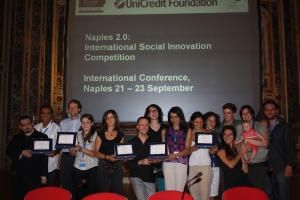By Lucas Fülling
In early 2011 Euclid Network launched its second international social innovation competition – Naples 2.0 –, this time with a completely new focus. The idea of the competition was not to reward existing initiatives but use social innovation as a tool that can be applied to concrete problems in one of the most challenging environments of Europe: Naples to find new ideas to solve those problems. We wanted to drift away from definitions of the concept of social innovation but move forward and see how people can use their creative potential to come up with innovative and sustainable ideas to bring along social change.
Together with our partners UniCredit Foundation and Project Ahead we were exploring particular challenges in Naples where state and market had little success in solving them. They ranged from the use of public assets, to unsustainable business models of civil society organisations, to new methodologies for social problems, as for example the integration of Roma. The challenges were concrete but there was no prescription of how to solve the challenge. This led to a very diversified portfolio of solutions, from ‘Scamping’ – Camping with the Roma in Scampia (a very deprived district of Naples) to sustainable tourism in a confiscated Camorra (Naples’ Mafia).
The competition did not only deliver more than 200 different ideas how to solve our challenges in Naples but also allowed people from the non-typical sectors to apply. Applications came from more than 30 countries with people working in agriculture, business, academia, civil society, and so forth. By opening the barriers to entry, providing a small monetary incentive (7,500 – 10,000 Euro) acting as seed capital for the implementation and trying to be as least bureaucratic as possible; real out of the box thinking were able to be harnessed.
Last September the winners were selected and are currently working on submitting their business plans, which, if satisfactory will open up more funding (~500,000 Euro) for turning the project into a sustainable business. All the winning ideas can be found on our website: www.euclidnetwork.eu. Apart from selecting the ideas to be implemented the competition sparked a social innovation momentum, with new initiatives taking off in Naples, as for example a hub for social innovation.
So, what works?
Much has already been written about the power of competitions to attract the unusual suspects, bringing forward innovative and new ideas and a good article has already been published on this blog “Competitions as a Platform for Social Innovation”. We would, however, stress the importance of constant communication with local partners, winners and organisers. Only by following the slogan ‘small money, big support’ we can ensure that the ideas are implemented successfully. This is why we ran workshops and tried to have as much contact with the winners of the competition as necessary. Support always works!
On top of that, seeing social innovation as a tool, rather than a concept that needs definition we experienced much more freedom in the choice of topics and the applications we have received. Sometimes defining social innovation can lead to more confusion and attrition in the process than to great ideas. Therefore, giving people a loose idea of what is required works!
The biggest advantage of social innovation competitions is also its biggest drawback: new and unexpected ideas. As these ideas might be good the outcome is unforeseeable, which introduces a high risk factor for investment in social innovation and may undermine its potential to social change. Maybe a next competition should exactly address this topic?! Being risk averse – does not work!
We are still awaiting the final outcomes of the competition; however, what we can say thus far competitions are a great tool to get great ideas from people and that always works!
